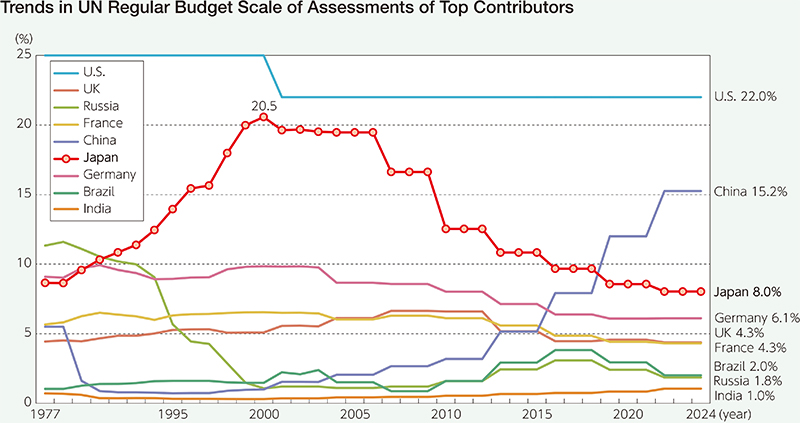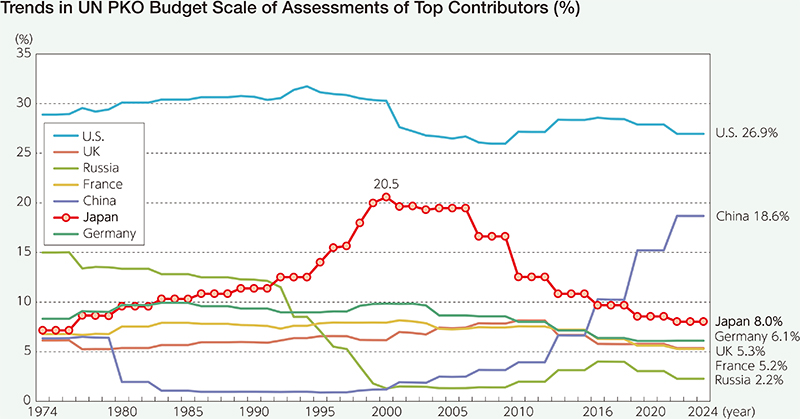Diplomatic Bluebook 2024
Chapter 3
Diplomacy to Defend National Interests through Co-creation with the World
5 Japan's Efforts at the United Nations
(1) Japan-UN Relationship
The UN is an international organization that nearly all the countries in the world are members of (193 countries as of December 2023). It addresses various challenges in diverse areas such as conflict resolution and peacebuilding, counter-terrorism, disarmament and non-proliferation, poverty and development, human rights, refugee issues, environment and climate change issues, disaster risk reduction, and public health.
Since joining the UN in 1956, Japan has leveraged both universality and expertise to realize policy aims through multilateral cooperation in a wide range of areas, including the three pillars of the UN─peace and security, development, and human rights. Japan is serving for the 12th time as a non-permanent member of the UN Security Council since January 2023, more frequent than any other UN Member State, and playing a key role in the maintenance of international peace and security. In order to support such activities, the Government of Japan financially contributes to the UN alongside actively engaging in the organizational aspects (management) of the UN. Japan also supports Japanese staff working in the UN to obtain important posts (See Chapter 4, Section 1, 2(1)). To realize strong and effective multilateralism that can protect and strengthen “human dignity,” Japan continues to work proactively to strengthen the functions of the UN, including UN Security Council reform.
(2) Major Events in 2023
The High-Level Week of the 78th UN General Assembly convened in September. Prime Minister Kishida and Foreign Minister Kamikawa attended from Japan.
In the General Debate of the UN General Assembly, Prime Minister Kishida shed a new light on “human dignity” at a time when the international community is facing multiple crises and increasingly being divided, and advocated “human-centered international cooperation” to overcome differences in national regimes or values. He stressed the need to consolidate the trend of nuclear disarmament mainstreaming, the importance of the rule of law, and of UN Security Council reform to strengthen the UN as a part of international cooperation to protect and strengthen “human dignity”.
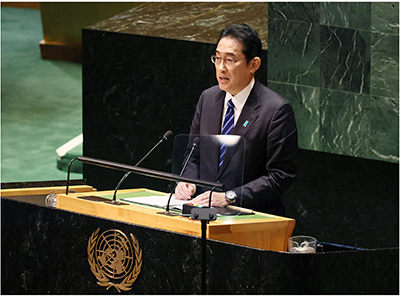 Prime Minister Kishida delivering an address at the General Debate of the UN General Assembly (September 19, New York, U.S.; Photo: Cabinet Public Affairs Office)
Prime Minister Kishida delivering an address at the General Debate of the UN General Assembly (September 19, New York, U.S.; Photo: Cabinet Public Affairs Office)Prime Minister Kishida attended the following five multilateral meetings during the High-Level Week.
At the Commemorative High-Level Event on a Fissile Material Cut-Off Treaty (FMCT) co-hosted by Japan, the Philippines, and Australia, Prime Minister Kishida delivered a keynote speech. He pointed out that, for the first time since the peak of the Cold War, the world is on the cusp of a reversal of the decreasing trend of the global number of nuclear arsenals, making it even more necessary to start early negotiations on an FMCT. In light of that, 2023 marks the 30th anniversary of the adoption of the UN General Assembly resolution calling for an FMCT, this event urged all countries to reinvigorate discussions by refocusing political attention toward an FMCT, and to use it as a new opportunity to work together toward the early commencement of negotiations.
At the 2023 SDG Summit, Prime Minister Kishida reiterated that, with the international community facing various difficulties, now is the time to return to the starting point of the SDGs, “Leave No One Behind,” and that “human security,” which Japan has consistently advocated, is key to achieving the SDGs based on “human dignity.” He clearly expressed Japan's determination to strongly lead the international community's efforts to achieve the SDGs and thereby open the way for our future.
At the Security Council High Level Open Debate on “Upholding the purposes and principles of the UN Charter through effective multilateralism: maintenance of peace and security of Ukraine,” Prime Minister Kishida once again strongly condemned Russia's aggression against Ukraine and emphasized the importance of realizing peace based on the principles of the UN Charter. He also expressed his determination to aim for “multilateralism rooted in a spirit of solidarity,” while protecting the dignity of people suffering in various parts of the world. Furthermore, he called for a world of cooperation rather than division and confrontation, along with concrete action to strengthen the functions of the UN, including UN Security Council reform.
At the UN General Assembly High-Level Meeting on universal health coverage (UHC), Prime Minister Kishida once again called on the international community to take actions toward achieving UHC.
Prime Minister also attended the G7 Health Follow-up Side Event. In his remarks, he affirmed the progress of the “MCM (Medical Countermeasures) Delivery Partnership for Equitable Access (MCDP),”46 one of outcomes of the G7 Hiroshima Summit in the area of health, and the “Impact Investment Initiative for Global Health (Triple I for GH)”.47 He also announced the launch of a new ODA loan scheme to enable the flexible and effective mobilization of funds necessary for prevention, preparedness, and response (PPR) in developing countries.
Prime Minister Kishida took the opportunity of the High-Level Week to hold two bilateral summit meetings, actively exchanging opinions on bilateral relations as well as on various issues in the international arena. During his stay in New York, he also attended the Global Goalkeepers Award 2023 ceremony and the Global Citizenship Awards annual gala. Furthermore, he delivered remarks to the Economic Club of New York, and communicated the achievements under the Kishida administration over the past year and its determination for the future, mainly in the economic field, such as the reform of the asset management sector and asset ownership to promote Japan as a Leading Asset Management Center. He further spoke about the Kishida administration's future intentions, and called for investment in Japan.
Foreign Minister Kamikawa engaged in active diplomacy during the High-Level Week, attending a total of 12 multilateral meetings, including the Meeting of the Foreign Ministers of the G4 countries on UN Security Council Reform, the G7 Foreign Ministers' Meeting, and the Japan-U.S.-ROK Foreign Ministers' Meeting, as well as 16 bilateral meetings and five summit events. In her meetings with various countries, Foreign Minister Kamikawa sent out a strong message on the rule of law and the importance of the UN, which should play a central role in that, and on strengthening the functions of the UN including UN Security Council reform. She also affirmed the importance of strongly promoting Women, Peace, and Security (WPS) as a part of Japan's diplomacy. Furthermore, she affirmed cooperation on regional affairs, such as in Ukraine and North Korea, and communicated to the international community Japan's position in areas such as health, disarmament, and environmental issues.
During the High-Level Week, Foreign Minister Kamikawa also met with Mr. Dennis Francis, President of the 78th session of the UN General Assembly. At the meeting, she emphasized the importance of strengthening the UN's functions, including UN Security Council reform, and expressed Japan's support for strengthening the role and authority of the General Assembly and President of the General Assembly.
UN Secretary-General António Guterres visited Japan to attend the G7 Hiroshima Summit in May, and met with Prime Minister Kishida during his visit. Prime Minister Kishida emphasized the importance of maintaining and strengthening the NPT with regard to nuclear disarmament and hoped that Japan's efforts would deepen understanding about the reality of atomic bombings, leading to the achievement of a world without nuclear weapons. Secretary-General Guterres stated that he valued Japan's contributions thus far, and hoped to work even more closely with Japan on nuclear disarmament. Both sides shared their views on the importance of the UN reform and strengthening of its functions toward the realization of a free and open international order based on the rule of law.
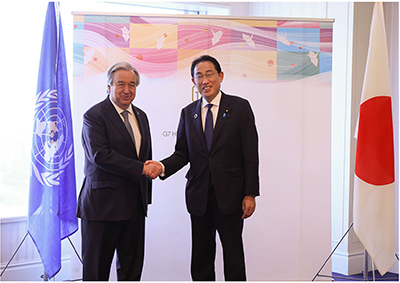 Prime Minister Kishida meeting with UN Secretary-General Guterres at the G7 Hiroshima Summit (May 21, Hiroshima City, Hiroshima Prefecture; Photo: Cabinet Public Affairs Office)
Prime Minister Kishida meeting with UN Secretary-General Guterres at the G7 Hiroshima Summit (May 21, Hiroshima City, Hiroshima Prefecture; Photo: Cabinet Public Affairs Office)- 46 Launched at the G7 Hiroshima Summit, this is an international cooperation framework that focuses on the delivery of medical countermeasures (MCMs) to ensure equitable access to MCMs.
- 47 An initiative that aims to mobilize private financial resources to resolve issues in the global health sector, through impact investments which intend to generate a measurable socially and/or environmentally beneficial impact alongside a financial return.
(3) UN Security Council and its Reform
A UN Security Council
The UN Security Council holds the primary responsibility within the UN for maintaining international peace and security. It is composed of five permanent members and 10 non-permanent members that are elected by UN Member States (for two-year terms). The UN Security Council's agenda covers a wide range of areas from the peaceful settlement of disputes and addressing proliferation of weapons of mass destruction and terrorism, to peacebuilding and WPS. In recent years, new themes such as climate change and food security have also been covered. The UN Security Council also has a mandate to determine the details of activities in UN Peacekeeping Operations (PKO) and UN Special Political Missions (SPM).
Japan was elected as a non-permanent member of the UN Security Council in June 2022, and is serving its two-year term from January 2023 for the 12th time as a non-permanent member, more frequent than any other UN Member State (See the Special Feature on page 252). In January, when Japan held the Security Council presidency, Foreign Minister Hayashi visited New York and hosted the ministerial Open Debate on the rule of law. Japan also hosted a meeting on peacebuilding during its presidency at the ambassadorial level. The UN Security Council has not been functioning effectively in its response to Russia's (a permanent member of the Council) aggression against Ukraine and North Korea's nuclear and missile activities that repeatedly violate UN Security Council resolutions and threaten the peace and security of Japan, the region, and the international community. Throughout its two-year term on the Council, Japan will communicate closely with other countries and engage in dialogues with the aim of maintaining and strengthening international order based on the rule of law while cooperating to enable the UN Security Council to fulfill its expected role. Japan will also contribute actively to discussions on the response to regional issues in the Middle East, Africa, and other regions, as well as on global issues such as climate change. As it has contributed during previous terms, Japan will continue to work on improving the work methods of the UN Security Council, including enhancing the efficiency and transparency of the Council.
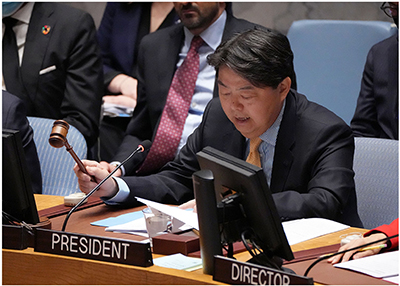 Foreign Minister Hayashi hosting the Ministerial Open Debate on the Rule of Law at the UN Security Council (January 12, New York, U.S.)
Foreign Minister Hayashi hosting the Ministerial Open Debate on the Rule of Law at the UN Security Council (January 12, New York, U.S.)For two years from January 2023, Japan has taken on the responsible role of a non-permanent member of the UN Security Council. This is the 12th time that Japan serves in this role, more times than any other UN Member State. Japan is working tirelessly in the UN Security Council every day for the peace and security of the international community.
●January 2023, Main Activities during Japan's Presidency of the UN Security Council
・Hosted the Ministerial Open Debate on the Rule of Law
Taking the opportunity of Japan's Presidency of the UN Security Council in January, Foreign Minister Hayashi hosted the Ministerial Open Debate on the Rule of Law in the UN Security Council on January 12. In the Open Debate, Foreign Minister Hayashi emphasized the following essential elements of the rule of law in light of the divisions among Member States as a result of Russia's aggression against Ukraine and other factors: firstly, observing the UN Charter, UN resolutions, and judgements by international tribunals, and other agreements in good faith; secondly, not allowing redrawing of borders by force or coercion; and, thirdly, cooperating with the Member States to stand up against violations of the UN Charter. He called on Member States for “uniting for the rule of law.” 77 countries, including the foreign ministers of three countries, attended the Debate and many expressed their support to Japan's stance that the rule of law, not rule by force, is important.
・Hosted Open Debate on peacebuilding at Ambassadorial Level
On January 26, Japan hosted the UN Security Council Open Debate (Permanent Representative Level) on “Peacebuilding and Sustaining Peace.” Ambassador Ishikane, Permanent Representative of Japan to the United Nations, chaired the Debate. He shed light on the increasingly complex issues that the international community should address in order to realize sustainable peace, as well as the importance of the role of “people” in peacebuilding and provoked discussions toward strengthening the functions of the UN, including the Security Council and the Peacebuilding Commission.
This meeting demonstrated the widespread interest in peacebuilding among the international community. 74 countries in Africa, Southeast Asia, and Central and South America that have experienced conflict, island countries that have suffered from the impact of climate change, as well as Ukraine and its neighboring countries made statements.
●The role of Japan in subsidiary organs under the UN Security Council
Japan contributes actively to the activities of the UN Security Council, serving as Chair of the Al-Shabaab Sanctions Committee and the Libya Sanctions Committee, and Vice-Chair of the Iraq Sanctions Committee, the UN Security Council 1718 Sanctions Committee, and the Working Group on Documentation and Other Procedural Questions. Japan also takes initiative in Security Council resolutions on Afghanistan as a co-penholder,1 leading discussions on the situation in Afghanistan in the Council.
●Contributions to key issues
In response to the repeated launches of ballistic missiles by North Korea, Japan works closely with the U.S., the Republic of Korea (ROK), and other relevant countries to lead discussions in the UN Security Council. In August, a meeting on the situation in North Korea was held for the first time in six years, provoking international debate toward improving the human rights situation in North Korea, including the immediate resolution of the abductions issue. With regard to the situation in Ukraine, Foreign Minister Hayashi attended the Security Council Ministerial Debate in February, and Prime Minister Kishida attended the Security Council High Level Open Debate in September, during which they once again strongly condemned Russia's aggression against Ukraine and emphasized the importance of the rule of law. With regard to the situation in Israel and Palestine, Japan worked in close coordination with the other members of the Security Council and contributed to the adoption of UN Security Council resolution 2712 calling for humanitarian pauses in the Gaza Strip, and UN Security Council resolution 2720 concerning the expansion of humanitarian assistance and monitoring in the Gaza Strip. Japan also contributed actively to discussions in meetings on the situation in other regions including Africa, Central and South America, as well as new themes such as food security, climate change, and artificial intelligence (AI).
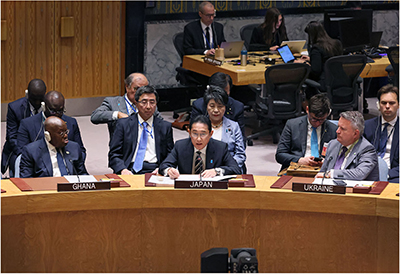 Prime Minister Kishida attending the Security Council High Level Open Debate on “Upholding the purposes and principles of the UN Charter through effective multilateralism: maintenance of peace and security of Ukraine” (September 20, New York, U.S.; Photo: Cabinet Public Affairs Office)
Prime Minister Kishida attending the Security Council High Level Open Debate on “Upholding the purposes and principles of the UN Charter through effective multilateralism: maintenance of peace and security of Ukraine” (September 20, New York, U.S.; Photo: Cabinet Public Affairs Office)In the face of various challenges confronting the international community, Japan will continue to contribute to the peace and security of the international community as a non-permanent member of the UN Security Council in 2024.
- 1 Refers to the member of the Security Council that leads discussions on a paticular agenda item and drafts documents such as resolutions and the chair's statements.
B Reform of the UN Security Council
More than 75 years have passed since the UN was established, and the structure of the international community has significantly changed while the UN's functions have become diverse. Despite this, the composition of the UN Security Council has largely remained unchanged to this day. In response to Russia's aggression against Ukraine in February 2022, a resolution that deplores the aggression by Russia and calls for the withdrawal of Russian troops was put to a vote in the UN Security Council. However, it was not adopted as Russia exercised its veto. Consequently, the UN Security Council was unable to take a coordinated response. This clearly shows that the UN Security Council cannot function effectively in response to situations such as Russia's aggression against Ukraine. There is a broadly shared view among the international community that an early reform of the UN Security Council is necessary to make the body more legitimate, effective, and representative.
To play an even more proactive role toward the realization of world peace and security through the UN, Japan has been making efforts to convince other countries to pursue an early UN Security Council reform, with the expansion of both permanent and non-permanent seats and Japan's admission as a permanent member.
C Recent Activities Regarding UN Security Council Reform
Since 2009, in the UN General Assembly, Member States have been engaging in the Intergovernmental Negotiations on UN Security Council reform. In 2023, five meetings took place between January and May. During the 77th session, a dedicated website was launched to broadcast parts of the IGN meetings online, and to store the relevant materials and statements by countries. At the end of June, following on from 2022, the decision to roll over the work of the 77th session to the 78th session was adopted by consensus at the UN General Assembly. In October, President Francis of the 78th session of the UN General Assembly reappointed the Permanent Representatives of Kuwait and Australia to the UN as co-chairs of the Intergovernmental Negotiations. The spotlight will be placed on how future discussions will progress under the new system.
Japan also places great importance on its initiatives as a member of the G4 (Japan, India, Germany and Brazil), a group that cooperates on promoting UN Security Council reform. Foreign Minister Kamikawa attended the Meeting of the Foreign Ministers of the G4 countries in September in conjunction with the High-Level Week of the UN General Assembly. At the meeting, the G4 Ministers shared their perceptions of the current situation regarding Security Council reform and discussed future directions of work, with recognition of the increasing importance of strengthening the functions of the UN, including Security Council reform, in order to restore confidence in the UN, which was damaged by Russia's aggression against Ukraine, among others. Foreign Minister Kamikawa called for striving for concrete actions toward the realization of Security Council reform, utilizing fora such as IGN, while looking ahead to the Summit of the Future in 2024 and the 80th Anniversary of the UN in 2025 as opportunities to build momentum for reform. On top of that, the G4 Ministers concurred to work closely with the President of the General Assembly for concrete discussion in the IGN and to cooperate with relevant countries including Africa and the U.S. to achieve concrete progress as soon as possible toward the realization of Security Council reform. Japan will continue to work closely with many countries and persevere toward the realization of UN Security Council reform.
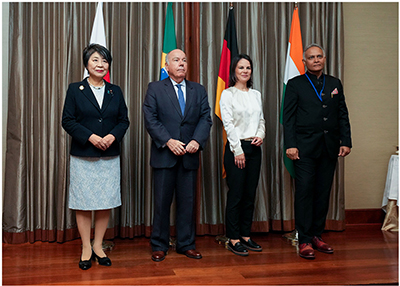 Meeting of the Foreign Ministers of the G4 Countries on UN Security Council Reform (September 21, New York, U.S.)
Meeting of the Foreign Ministers of the G4 Countries on UN Security Council Reform (September 21, New York, U.S.)(4) Organizational Aspects of the UN (Management)
A Management
UN Secretary-General Guterres positions reforms in the management of the UN along with peace efforts and development as issues of priority, and works continuously to enhance global governance. In 2021, he issued a report entitled “Our Common Agenda” which proposed concrete measures to adapt the UN to a new era. Japan supports the objectives of the reform with the hope that the UN will fulfill its mission more effectively and efficiently.
B Budget
The UN budget is mainly composed of the regular budget for general activities (an annual budget for the period from January to December), and the peacekeeping budget related to peacekeeping operations (an annual budget for the period from July to the following June).
With regard to the regular budget, a budget for 2024 amounting to approximately 3.59 billion U.S. dollars was approved in December 2023 at the UN General Assembly. The budget for peacekeeping operations for the period of 2023-2024 amounting to approximately 6.05 billion U.S. dollars in total was approved in June 2023.
The budget to support UN activities is composed of assessed contributions paid by Member States and voluntary contributions provided in accordance with Member States' policy needs. With regard to assessed contributions, Japan currently ranks third after the U.S. and China. Japan contributed approximately 234.99 million U.S. dollars to the UN regular budget for 2023, and approximately 486.30 million U.S. dollars to the peacekeeping budget for 2023/24. As a major financial contributor, Japan has been encouraging the UN to make more efficient and effective use of its financial resources. The scale of assessments, which provides the basis for calculating the amount of assessed contributions, is revised every three years based on the capacities to pay of the Member States. Japan's scale of assessment, revised at the end of 2021, is 8.033% (2022-2024), behind the U.S. and China.
Key bodies that address administrative and budgetary matters of the UN are the Advisory Committee on Administrative and Budgetary Questions (ACABQ) and the Committee on Contributions. Both are standing subsidiary committees of the General Assembly and are comprised of members serving in their personal capacities. The ACABQ reviews the overall administrative and budgetary issues of the UN and makes recommendations to the General Assembly, while the Committee on Contributions submits a proposal on the scale of assessments of the regular budget for a decision to be made by all Member States at the General Assembly. Hence, both committees play an important role. Members from Japan have served continuously on both of these committees.
